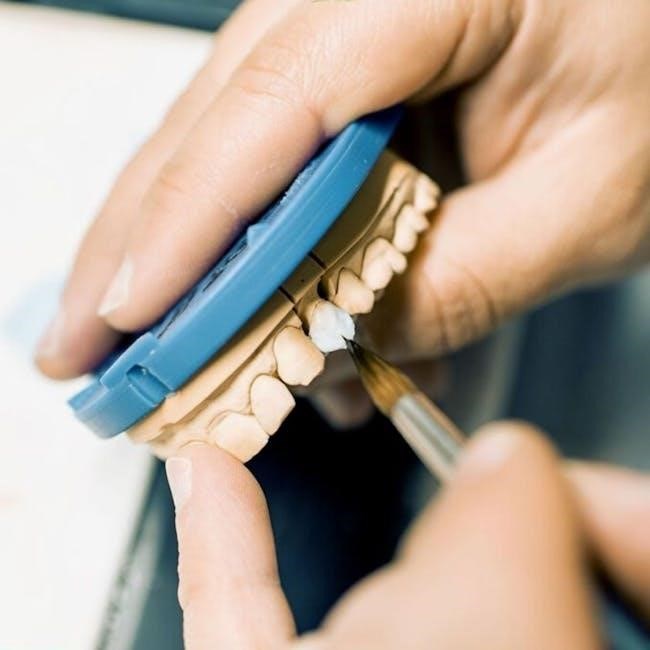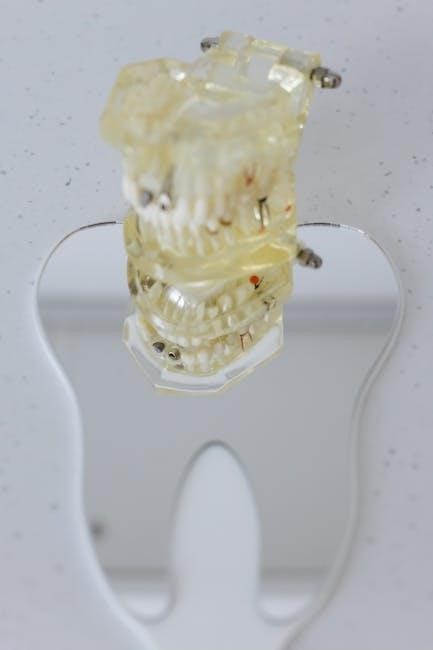Denture tooth shape guide helps in selecting the most suitable tooth form for dentures‚ ensuring aesthetic appeal and functional needs are met for a natural look and feel․
Importance of Tooth Shape in Dentures
Tooth shape plays a crucial role in both the aesthetic and functional success of dentures․ Properly shaped teeth ensure a natural appearance‚ aligning with facial features and creating a harmonious smile․ They also affect chewing efficiency‚ speech clarity‚ and overall comfort․ Misshapen teeth can lead to poor fit‚ discomfort‚ and difficulty in performing daily functions․ Selecting the right tooth shape enhances confidence and restores oral function‚ making it a key factor in achieving a natural‚ comfortable denture experience․
Overview of Denture Tooth Shape Options
Denture tooth shape options vary widely‚ catering to individual needs․ They include rounded‚ square‚ or tapered forms‚ each offering distinct aesthetic and functional benefits․ Rounded teeth are ideal for a natural‚ youthful look‚ while square teeth provide a more defined‚ youthful appearance․ Tapered shapes suit those with narrow facial features․ Additionally‚ customizable options allow for precise matching to existing teeth or desired aesthetics․ Modern advancements also offer highly realistic‚ anatomically correct shapes‚ enhancing both comfort and performance․ These diverse options ensure personalized solutions‚ addressing unique patient requirements for optimal satisfaction and functionality․

Key Considerations for Selecting Denture Tooth Shape
Facial structure‚ jaw alignment‚ and aesthetic preferences are crucial․ Tooth shape must enhance comfort‚ bite efficiency‚ and natural appearance‚ tailored to individual needs for optimal functionality and confidence․
Factors Influencing Tooth Shape Selection
Several factors influence tooth shape selection‚ including the patient’s facial symmetry‚ jaw alignment‚ and aesthetic preferences․ Dental impressions play a key role in determining the most suitable shape by providing precise measurements of the mouth․ Additionally‚ the patient’s age‚ gender‚ and overall dental health are considered to ensure a natural appearance․ The dentist may also evaluate the patient’s bite and chewing efficiency to recommend shapes that enhance functionality․ Furthermore‚ the psychological impact of tooth shape on the patient’s self-confidence cannot be overlooked‚ making it a crucial element in the decision-making process․ Each factor contributes to creating a personalized and effective denture solution․
Role of Dental Impressions in Determining Tooth Shape
Dental impressions are critical in determining tooth shape for dentures‚ as they provide precise molds of the patient’s mouth․ These impressions capture the exact contours of the gums and jaw‚ enabling accurate measurements․ They help in assessing the spacing and alignment needed for the denture teeth․ By analyzing the impressions‚ dentists can identify the most suitable tooth shape that complements the patient’s oral structure․ Additionally‚ impressions ensure that the dentures fit comfortably and function properly․ This step is essential for creating natural-looking and well-fitting dentures tailored to the individual’s unique dental anatomy and aesthetic requirements․


Impact of Aesthetics on Denture Tooth Shape
Aesthetic considerations significantly influence denture tooth shape‚ ensuring a natural and visually appealing smile that aligns with the patient’s facial features and personal preferences for a seamless look․
Matching Tooth Shape to Facial Features
Matching tooth shape to facial features ensures a harmonious and natural appearance․ The shape of the teeth should complement the patient’s facial structure‚ jaw alignment‚ and lip contours․ For instance‚ individuals with a square face may benefit from more rounded teeth to soften their look‚ while those with an oval face might opt for a balanced‚ rectangular shape․ Dental professionals analyze facial symmetry and proportions to select tooth forms that enhance the patient’s smile and overall aesthetic․ This personalized approach ensures the dentures blend seamlessly with their natural features‚ creating a visually pleasing and authentic result․
Color and Shade Selection for Natural Appearance
Color and shade selection play a critical role in achieving a natural-looking smile with dentures․ The process involves matching the tooth shade to the patient’s natural teeth‚ skin tone‚ and facial features․ Dental professionals use standardized shade guides to ensure accuracy‚ while also considering the gum color and overall aesthetic goals․ Proper shade selection enhances the illusion of real teeth‚ boosting confidence and satisfaction․ Customization options allow for adjustments to achieve the desired appearance‚ ensuring the dentures blend seamlessly with the patient’s natural characteristics for a lifelike and appealing result․

Functional Considerations in Denture Tooth Shape
Denture tooth shape affects chewing efficiency‚ bite force‚ and overall functionality․ Proper fit and stability ensure optimal performance and comfort for the wearer․
How Tooth Shape Affects Bite and Chewing Efficiency
The shape of denture teeth directly influences bite and chewing efficiency․ Properly designed teeth ensure even distribution of forces‚ preventing uneven wear and improving mastication․ Sharp‚ pointed shapes enhance cutting‚ while flat‚ broad surfaces facilitate grinding․ The alignment and contour of teeth guide jaw movements‚ maintaining stability during chewing․ Incorrect shapes can lead to poor fit‚ discomfort‚ and reduced chewing performance․ Thus‚ selecting appropriate tooth shapes is crucial for achieving both functional efficiency and patient satisfaction with dentures․
Importance of Proper Occlusion in Denture Design
Proper occlusion in denture design ensures that the upper and lower teeth align correctly‚ distributing forces evenly during biting and chewing․ Misaligned occlusion can lead to uneven wear‚ sore spots‚ and instability of the denture․ Achieving proper occlusion enhances chewing efficiency‚ reduces the risk of bone loss‚ and improves overall comfort․ It also ensures that the dentures function naturally‚ supporting facial aesthetics and speech clarity․ Accurate occlusal alignment is critical for long-term satisfaction and functionality of dentures‚ making it a cornerstone of successful denture design․

Modern Trends in Denture Tooth Shape
Modern trends emphasize customizable denture teeth with advanced digital technology‚ offering precise fit‚ natural aesthetics‚ and improved functionality through 3D printing and CAD/CAM systems․
Advancements in Customizable Denture Teeth
Recent advancements in customizable denture teeth focus on precision and personalization‚ leveraging technologies like 3D printing and CAD/CAM systems․ These tools allow for highly accurate tooth reproduction‚ ensuring a natural appearance and optimal fit․ Digital dentistry enables dentists to design teeth that match individual facial features and bite requirements․ Patients can now choose from a wide range of shapes‚ shades‚ and materials to achieve a smile that looks and feels authentic․ Customizable options also improve chewing efficiency and comfort‚ making modern dentures more functional and aesthetically pleasing than ever before․ This innovation enhances patient satisfaction and restores confidence in their dental restoration journey․
Role of Digital Dentistry in Tooth Shape Precision
Digital dentistry has revolutionized tooth shape precision by utilizing advanced technologies like 3D printing and CAD/CAM systems․ These tools enable highly accurate tooth reproduction‚ ensuring a perfect match to the patient’s oral anatomy․ Digital impressions capture precise details‚ eliminating errors associated with traditional methods․ Software allows dentists to design and customize tooth shapes‚ aligning them with the patient’s facial features and bite requirements․ This level of customization enhances both aesthetics and functionality‚ providing natural-looking and well-fitting dentures․ Digital dentistry also streamlines the manufacturing process‚ ensuring consistency and reproducibility․ As a result‚ patients benefit from more precise‚ comfortable‚ and visually appealing denture solutions that meet their unique needs․ This innovation elevates the standard of care in denture design and fabrication․
Selecting the right denture tooth shape is crucial for both aesthetics and functionality‚ ensuring a natural appearance and optimal chewing efficiency‚ tailored to individual patient needs and preferences․

Leave a Reply